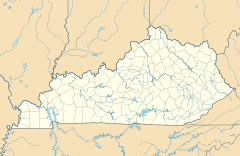Karlus, Kentucky facts for kids
Quick facts for kids
Karlus
|
|
|---|---|
| Country | United States |
| State | Kentucky |
| County | Russell |
| Elevation | 984 ft (300 m) |
| Time zone | UTC-6 (Central (CST)) |
| • Summer (DST) | UTC-5 (EDT) |
| GNIS feature ID | 508368 |
Karlus is a small place located in Russell County, Kentucky, in the United States. It is known as an unincorporated community. This means it is a group of homes and businesses that do not have their own local government, like a city or town would.
What is Karlus?
Karlus is not a city or a town with its own mayor or city council. Instead, it is a collection of homes and possibly some businesses. These places are often found in more rural areas. People living in Karlus get their services, like police and fire protection, from the larger Russell County government.
Where is Karlus Located?
Karlus is situated in the state of Kentucky, which is in the southeastern part of the United States. More specifically, it is found within Russell County. This county is known for its beautiful natural areas and lakes. The exact coordinates for Karlus are 36 degrees, 59 minutes, 38 seconds North and 85 degrees, 1 minute, 35 seconds West. It sits at an elevation of about 984 feet (300 meters) above sea level.
Understanding Unincorporated Communities
An unincorporated community, like Karlus, is a place where people live close together but do not have a separate local government. Here is what that means:
- No City Government: There is no city hall, no city mayor, and no city council.
- County Services: The people living there rely on the county government for things like roads, schools, and emergency services.
- Different from Cities: Cities and towns have their own local laws and services, often funded by city taxes. Unincorporated areas do not have these specific city taxes or laws.
- Common in Rural Areas: Many unincorporated communities are in countryside areas. They might be small neighborhoods or even just a few houses grouped together.
These communities are important parts of their counties. They contribute to the local culture and economy, even without their own city government.



